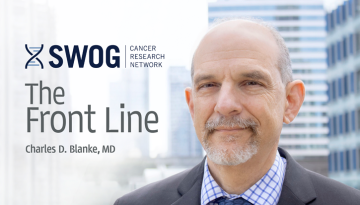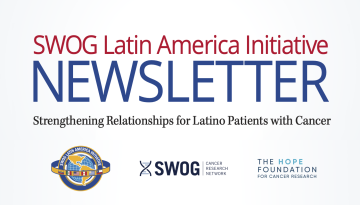SLAI Clinical Trials Training Course: Bogota 2023
If you want evidence of the impact and import of SWOG's Latin America Initiative (SLAI), I recommend you attend the next installment of our annual SLAI international clinical trials training course.
The course is planned and conducted each year in close collaboration with a member institution in Latin America, who hosts the event. This fall we partnered with Colombia’s
Instituto Nacional de Cancerología (INC) who, in their extensive tweeting of the course, reminded us that it also marked 10 years of collaboration between INC and SWOG (time flies!).
The 2023 course was held November 29 to December 1 in Bogota, and online, with a focus on cancers related to infections. These include gastrointestinal and gynecologic cancers, such as Helicobacter pylori-driven stomach cancers, and cancers caused by the human papilloma virus (HPV), such as cervical, anal, and oral cavity tumors.
The course curricula are primarily mapped out by our colleagues at Cancer Research And Biostatistics (CRAB). John Crowley, PhD, past SWOG group statistician and one of the key figures in establishing our SWOG Latin America Initiative, is prominent among them.
“The investigators at INC Colombia are dedicated to the fight against cancer,” he said, “and are anxious to increase their involvement with SWOG as a means of reducing the cancer burden in their country. This conference furthered those aims.”
A broad cross section of SWOG’s leadership (past, present, and future) presented at the event, and, as with most SLAI initiatives, support from The Hope Foundation for Cancer Research made this possible. Simultaneous translation between English and Spanish was provided, and the session was live-streamed, with recordings of each day’s proceedings available on YouTube (Day 1, Day 2, and Day 3).
In past years, the course has featured two days of presentations with Q&A sessions, followed by a third day reviewing research proposals by local investigators.
This year we changed things up, introducing hands-on workshops on two of the afternoons to give attendees a more interactive experience that would help them to advance their research design skills.
On one of those two afternoons, Dr. Crowley and his CRAB colleague Rachael Sexton led a workshop on calculating sample sizes and developing a statistical analysis plan. The two presented examples from local projects the SLAI team had previously reviewed, and their interactive approach gave investigators a chance for hands-on practice using the online statistical tools CRAB provides gratis on its website.
Dr. Mariana Chavez Mac Gregor, SWOG executive officer for international affairs, would like to see the hands-on immersion and local connections expanded in future courses.
“It was exciting that some of the materials and examples from this workshop came from actual local proposals that addressed local research interests or needs,” she said.
“Our team hopes to continue to develop more hands-on workshops in the future. We feel like getting attendees actively involved and engaged with hands-on, real-life examples will make them more confident researchers.”
Another change in this year’s event was that the team evaluating the research proposals presented by local investigators included local reviewers – in this case, researchers from Colombia’s INC, who considered projects with an eye toward potentially funding one or more of them within a newly formed Colombian national cancer research network.
“Due to limited funding, Latin American countries often do not have many clinical trials available,” Dr. Chavez Mac Gregor explained, “and most tend to be pharma-sponsored and do not necessarily respond to local population needs. We were excited to learn about the efforts to start a Colombian research network; these types of initiatives are fundamental to allow them to understand and respond to critical needs for their populations.”
The researcher whose project scored highest with the reviewers in Bogota (that project was a proposed trial comparing neoadjuvant treatment options for patients with high-grade retroperitoneal sarcomas) will be invited to a SWOG group meeting, which should open up collaboration opportunities and provide them additional insight into how the U.S. cooperative groups function.
If you’d like to be added to the mailing list for announcements about next fall’s SLAI course, send a request to communications@swog.org.
___________________________________________________
Trial of the Week
S2213: A Phase III, Randomized Study of Daratumumab, Cyclophosphamide, Bortezomib and Dexamethasone (Dara-VCD) Induction Followed by Autologous Stem Cell Transplant or Dara-VCD Consolidation and Daratumumab Maintenance in Patients with Newly Diagnosed AL Amyloidosis
Our Trial of the Week is just out of the starting gate – it activated December 1st.
S2213 will enroll patients newly diagnosed with systemic AL amyloidosis. The study team hypothesizes that among these patients, those who undergo an autologous stem cell transplant will have better outcomes than those who undergo consolidation therapy without a transplant.
All participants start with induction therapy consisting of three cycles of Dara-VCD – daratumumab, cyclophosphamide, bortezomib, and dexamethasone.
Patients whose disease shows at least a partial response to this induction will then be randomized either to consolidation with another three cycles of Dara-VCD or to an autologous stem cell transplant with melphalan. Maintenance therapy on both arms will be daratumumab – up to 18 cycles.
The trial’s primary endpoint is major organ deterioration progression-free survival (MOD-PFS), but the study team will also compare minimal residual disease negativity rates, patient-reported physical function, and patient-reported symptoms of treatment-emergent adverse events, among other endpoints.
The enrollment target is 338 patients (to randomize 286 participants) over an expected five-year accrual period. AL amyloidosis is a rare disease, and the total number of transplants for the disease in the United States each year is only around 300. So, we need to enroll about 20 percent of all U.S. transplant patients to complete this trial in a reasonable time frame.
The S2213 study chair is Patrick A. Hagen, MD, MPH, of Loyola University Medical Center, in partnership with Surbhi Sidana, MD (study co-chair); Terri Parker, MD (quality of life/patient-reported outcomes chair); and Brian Walker, PhD (TM chair).
Lead biostatisticians on the trial are Antje Hoering, PhD, and Joseph Unger, PhD (QoL/PRO).
I also want to give a shout-out to our study champions and thank them for supporting the trial:
- Heather Landau, MD, Alliance
- Anita D’Souza, MD, BMT-CTN
- Taxiarchis Kourelis, MD, ECOG-ACRIN
S2213 will answer an essential question for our patients with AL amyloidosis. Learn more on the SWOG S2213 page or the CTSU S2213 page, and please consider opening it at your site.
Other Recent Stories



